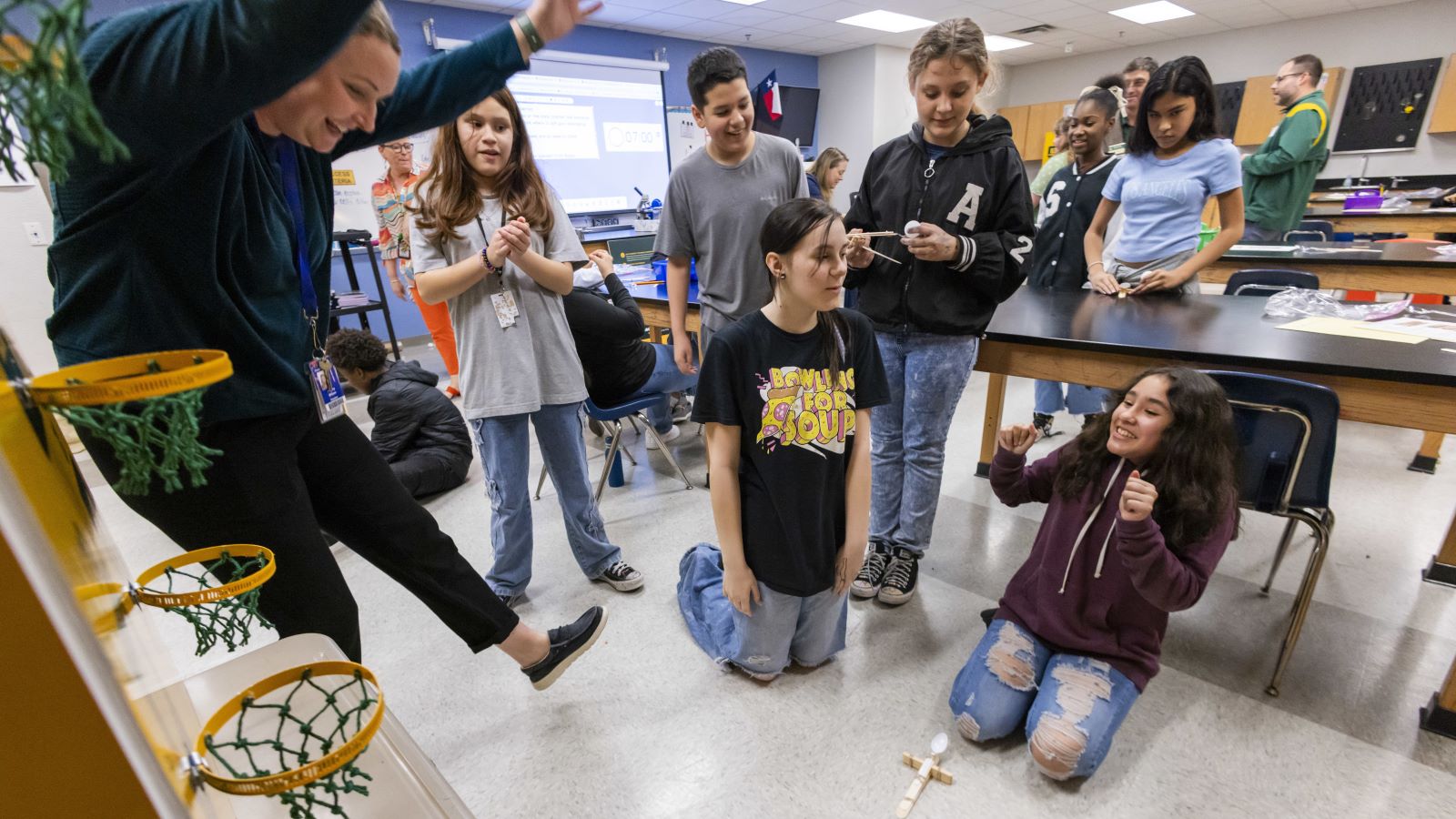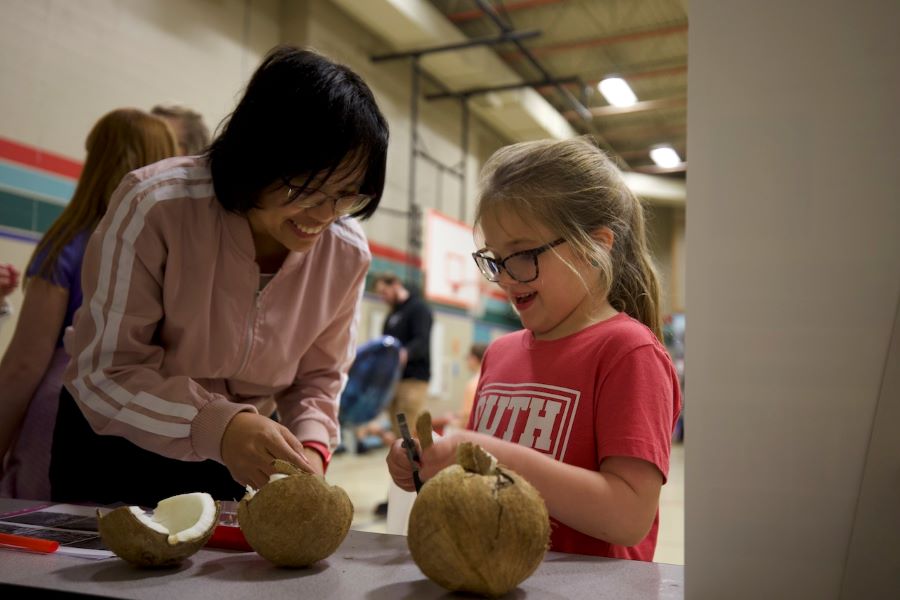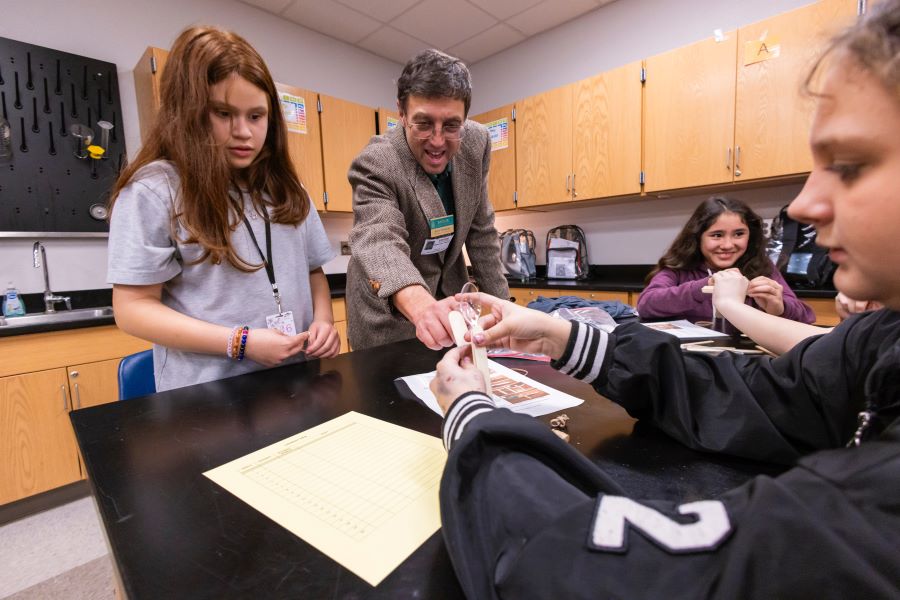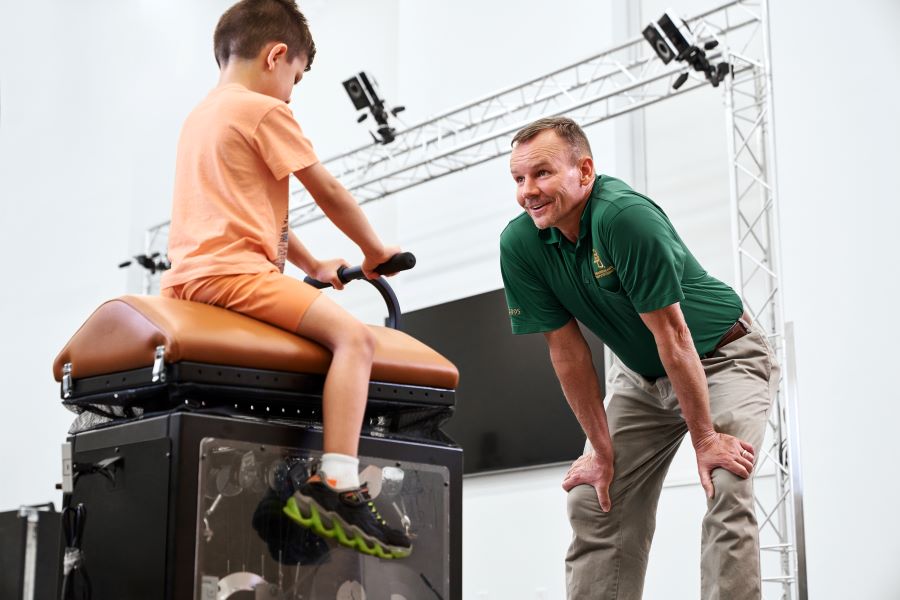Baylor Celebrates National Engineers Week in Waco-Area Schools
Baylor engineering faculty visit local classrooms to lead hands-on projects to spark interest in innovation and creative problem-solving

Students celebrate as their catapult, engineered out of popsicle sticks and rubber bands, hits the target. (Baylor University)
Contact: Lori Fogleman, Baylor University Media and Public Relations, 254-709-5959
Follow us on X (Twitter): @BaylorUMedia
WACO, Texas (Feb. 23, 2024) – Baylor University partnered with schools in three Waco-area districts to celebrate National Engineers Week through hands-on engineering experiences with Baylor faculty and students. In partnership with Waco ISD, Midway ISD and China Spring ISD, Baylor researchers visited South Bosque Elementary (Midway ISD), Cesar Chavez Middle School (Waco ISD) and China Spring High School to connect their own engineering work to foundational problem-solving skills used by students of every age level.
National Engineers Week was founded in 1951 by the National Society of Professional Engineers and has grown into a widely observed week to celebrate innovation, promote engineering education and encourage the future engineering workforce. This year, National Engineering Week was celebrated Feb. 18-24.
“National Engineers Week is a perfect opportunity to encourage interest in engineering and to help students connect the dots between their own natural curiosity and the approaches that professional engineers use to innovate and problem-solve,” said Stacey Smith, Ph.D., assistant vice provost for research development at Baylor. “Baylor University is blessed with outstanding research faculty driven to improve lives through their work, and we’re grateful for the opportunity to partner with area schools to connect them with local students.”
Distinguished research faculty
Baylor faculty led students in an activity approved for every age level by a variety of engineering educational organizations—catapult basketball. More specifically, Baylor researchers and Baylor students worked with Waco-area students to build their own catapults out of popsicle sticks, tongue depressors, rubber bands and more. Students then launched ping pong balls from the catapult they designed into specially made basketball hoop-style targets and then adjusted their design to better hit their targets.
As students built their catapults, they were introduced to the Engineering Process, a problem-solving approach used by professional engineers. In presentations to the classes, Baylor faculty connected students’ own creativity in building the catapults to their own research projects to help students recognize their innate problem-solving skills and encourage students’ further interest in the subject.
“I love this Baylor outreach and love the chance to demonstrate to our students that we already use these processes. This is something that we do, and it's something that we're good at as human beings. We ask questions and we see things in our environment,” said Kristina May, Waco ISD secondary science curriculum coordinator. “This is such a fantastic opportunity to partner with Baylor and exciting to see our kids walk out of class knowing they were an engineer for the day.”
This year’s Baylor faculty participants from the School of Engineering and Computer Science include:
- Brian Garner, Ph.D., associate professor of mechanical engineering;
- Alex Yokochi, Ph.D., professor of materials, energy and chemical processes; and
- Ning Zhang, Ph.D., assistant professor of mechanical engineering.
In addition, Baylor students from each professor’s laboratory joined them at the schools to help present the activities.
“Engineers are problem-solvers, to try to identify and come up with workable solutions and improve people’s quality of life,” Garner said. “I’ve been blessed to work on some very interesting and fun projects, and I want to share with students the idea of, ‘Hey, look what kind of things can be done. You can accomplish things that can be a service and a blessing to other people.’”
Each faculty member has earned a national reputation as leading engineering scholars, and all have built significant research portfolios, which they will demonstrate to students commensurate to their grade level. The Office of Broader Impacts within Baylor’s Office of the Vice Provost for Research partners with faculty to create grade-appropriate adaptations of their work to illuminate their field to students of all ages.
“The connection made between our students and Baylor researchers is important because it exposes our students to real-world applications to what they are learning in the classroom with the ultimate hope of inspiring them to become future innovators and leaders in these fields,” said Sheri Burns, South Bosque Elementary School principal.
Do-it-yourself activity
In addition to in-school activities, Baylor has provided a version of the in-class activities for families or classes to download online, including a printable target and instructions, along with a list of supplies students need to build their own catapults at home.
ABOUT BAYLOR UNIVERSITY
Baylor University is a private Christian University and a nationally ranked Research 1 institution. The University provides a vibrant campus community for more than 20,000 students by blending interdisciplinary research with an international reputation for educational excellence and a faculty commitment to teaching and scholarship. Chartered in 1845 by the Republic of Texas through the efforts of Baptist pioneers, Baylor is the oldest continually operating University in Texas. Located in Waco, Baylor welcomes students from all 50 states and more than 100 countries to study a broad range of degrees among its 12 nationally recognized academic divisions.
ABOUT THE SCHOOL OF ENGINEERING AND COMPUTER SCIENCE AT BAYLOR UNIVERSITY
Baylor’s School of Engineering and Computer Science (ECS) has been preparing its students for more than 25 years as innovators for worldwide impact by training graduates for professional practice and responsible leadership with a Christian worldview. Students can choose from majors including bioinformatics, computer science, data science, electrical and computer engineering, general engineering and mechanical engineering. ECS also offers graduate programs in all areas of study within the School. We stand out from the crowd through Christian commitment, R1 research, a strong community, personalized career support, expert accessibility, and leading practical experience. Visit the ECS website to learn more and follow on Instagram and Facebook.


